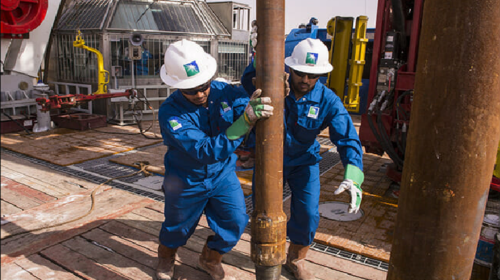Saudi Arabia, the world’s largest oil producer, has ramped up development at the natural gas-rich Jafurah field in the Eastern Province, considered the largest unconventional field of its kind in the Kingdom.
State-owned Saudi Arabian Oil Co., aka Aramco, secured regulatory approval in early 2020 to develop the mega field, which holds an estimated 200 Tcf.
Designed to meet the “rising demand for high-value petrochemicals feedstock,” Jafurah is expected by 2030 to produce 2.2 Bcf/d, along with 418 MMcf/d of ethane and 630,000 b/d of natural gas liquids and condensate, according to Aramco. Production also would complement new hydrogen projects and support the company’s integrated gas portfolio.
“This is a pivotal moment in the commercialization of Saudi Arabia’s vast unconventional resources program,” Aramco CEO Amin H. Nasser said. “It is a breakthrough that few outside the Kingdom thought was possible, and which has positive implications for energy security, economic development and climate protection.
“Gas has a critical role to play in the energy transition, and it will help significantly reduce emissions in the domestic energy sector, while providing a feedstock for low-carbon hydrogen and ammonia. It will also allow Aramco to tap into high-value feedstocks for use in the expanding downstream petrochemicals industry, and our aim is to significantly increase our gas production capacity over the next decade to meet demand growth.”
Jafurah covers an area measuring 17,000 square kilometers (6,564 square miles). Aramco is the sole supplier of gas to Saudi Arabia, which is the seventh largest gas market in the world. In 2019, the Kingdom had proven gas reserves estimated at 237.4 Tcf.
Aramco had planned by 2030 to be among the world’s top gas producers and liquefied natural gas exporters. However, the energy transition upended some assumptions, leading the world’s largest oil producer to reset a goal to become a top blue hydrogen manufacturer and exporter. Exporting gas is no longer a priority, but carbon capture and sequestration is.
At peak production, the company’s unconventional gas program is expected to replace around 500,000 b/d of oil “that would otherwise have been used for domestic consumption,” Aramco noted. “The Jafurah gas development alone is expected to replace more than 300,000 b/d of crude oil at peak production.”
Aramco has set a 2050 target to achieve net zero carbon emissions from direct and indirect sources (Scope 1 and 2) across its operated assets. Jafurah is expected to also contribute to the Kingdom’s goal by 2060 to have net zero emissions, with one-half of its electricity produced from natural gas and the other half from renewables.
“The development of Jafurah is a game changer for our Unconventional Resources program,” said Aramco’s Nasir K. Al-Naimi, Upstream senior vice president. “It will be one of the most modern, cost-efficient shale development schemes in the industry and observe the highest environmental and safety standards.
“Jafurah will be a key enabler of our ambitions moving forward, and we continue to explore new fields, reevaluate existing ones and evaluate potential joint investment opportunities in both natural gas and natural gas liquids as we pursue our goal of developing an integrated global gas portfolio to meet long-term energy and petrochemicals demand.”
Aramco has awarded contracts worth $10 billion for subsurface work and for engineering, procurement and construction. Capital expenditures for Jafurah are estimated at $68 billion over the first 10 years of development. Aramco expects total overall lifecycle investment at Jafurah to exceed $100 billion. Through its unconventional gas program at the Jafurah, North Arabia and South Ghawar fields, the company also expects to create more than 200,000 direct and indirect jobs.
Plans for Jafurah include constructing a gas processing plant, a gas compression system and a network of around 1,500 kilometers (932 miles) of main transfer pipelines, flow lines and gas gathering pipelines. The program also includes constructing the Jafurah Bulk Supply Point, transmission lines, power interconnection for Jafurah Gas Plant and cogeneration plant facilities.





